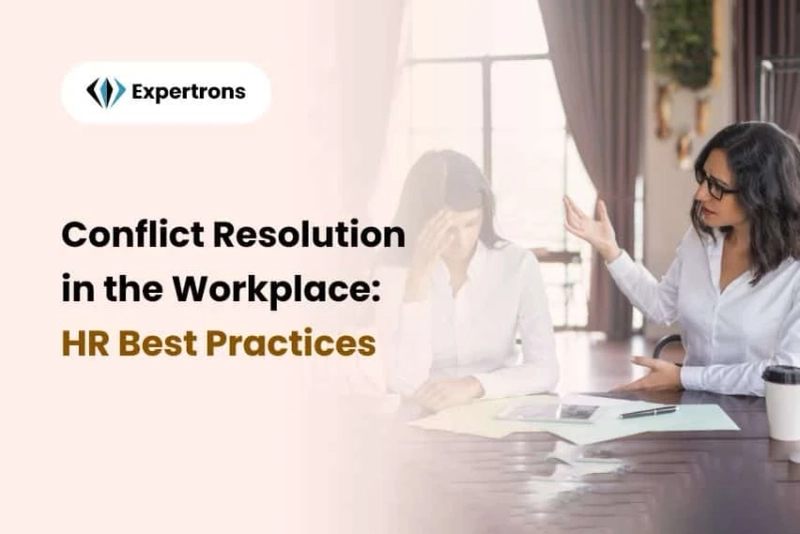Introduction
Workplace Conflict Resolution, an integral part of effective Human Resources management, plays a pivotal role in maintaining harmony within dynamic work environments. Addressing conflicts not only cultivates a positive workplace culture but also enhances productivity and employee satisfaction. In this blog, we\'ll explore essential HR best practices for workplace conflict resolution while subtly introducing opportunities for professional growth.
Proactive Communication:
Prevention is key when dealing with workplace conflicts. HR professionals should foster open and transparent communication within teams, promoting active listening and providing platforms for expressing concerns. Proactive communication can address potential conflicts, contributing to a positive work culture.
Establishing Clear Policies:
Effective HR practices involve developing and communicating clear workplace conflict resolution policies. Employees should be aware of the steps in addressing conflicts, including reporting mechanisms and HR\'s role. Well-defined policies set expectations and provide a framework for fair conflict resolution.
Mediation and Facilitation:
HR professionals, trained in conflict resolution techniques, play a crucial role in mediating and facilitating resolutions. Mediation, involving a neutral third party, helps conflicting parties reach a mutually acceptable agreement. This approach aids in guiding discussions and finding constructive solutions.
Training and Development Programs:
Equipping employees and managers with workplace conflict resolution skills is crucial for minimizing workplace conflicts. HR should implement training programs focusing on communication, emotional intelligence, and collaborative problem-solving. Investing in these skills creates a harmonious work environment.
Timely and Fair Investigations:
When formal intervention is needed, HR should conduct timely and fair investigations. Gathering relevant information, interviewing involved parties, and maintaining objectivity are crucial steps. A thorough investigation ensures fair resolutions and prevents further escalation.
Encourage a Culture of Feedback:
A workplace culture valuing feedback aids in early conflict detection and resolution. HR practices involve fostering an environment where constructive feedback is encouraged. Regular check-ins and performance reviews provide opportunities for open discussions.
Continuous Improvement:
Post-resolution analysis is essential for continuous improvement. Learning from past conflicts and adjusting policies ensures organizational evolution. This adaptive approach helps build a more resilient and harmonious workplace.
Conclusion:
Effective conflict resolution is essential in HR management, creating a positive workplace. As organizations prioritize conflict resolution best practices, it also emphasizes the importance of continuous professional development. In this context, Expertrons introduces a groundbreaking Post Graduate Certification in Advanced General Management, in collaboration with AIMA. This AICTE-approved program offers specialization in Human Resources, providing aspiring professionals with the skills and knowledge needed for success in today\'s dynamic business landscape.
Frequently Asked Questions
- Why is workplace conflict resolution important for Human Resources management?
Workplace conflict resolution is crucial as it helps maintain harmony in dynamic work environments. It fosters a positive workplace culture, enhances productivity, and contributes to employee satisfaction.
2. How can proactive communication prevent workplace conflicts?
Proactive communication involves fostering open and transparent communication within teams, promoting active listening, and providing platforms for expressing concerns. This approach can address potential conflicts, contributing to a positive work culture.
3. What role do clear policies play in workplace conflict resolution?
Clear workplace conflict resolution policies set expectations and provide a framework for fair and consistent resolution. Employees become aware of the steps involved, reporting mechanisms, and the role of HR in the resolution process.
4. How do mediation and facilitation contribute to conflict resolution?
HR professionals, trained in workplace conflict resolution techniques, play a crucial role in mediating and facilitating resolutions. Mediation, involving a neutral third party, helps conflicting parties reach mutually acceptable agreements, guiding discussions and finding constructive solutions.
5. Why is training and development essential for minimizing workplace conflicts?
Equipping employees and managers with conflict-resolution skills through training programs focusing on communication, emotional intelligence, and collaborative problem-solving is essential for creating a harmonious work environment.
6. What is the importance of continuous improvement in conflict resolution practices?
Post-resolution analysis is crucial for continuous improvement. Learning from past conflicts and adjusting policies ensures organizational evolution, contributing to building a more resilient and harmonious workplace.
7. How does Expertrons\' PG Certification in Advanced General Management align with professional growth?
Expertrons\' PG Certification, in collaboration with AIMA, offers a specialized track in Human Resources. This AICTE-approved program equips professionals with the skills and knowledge needed for success in today\'s dynamic business landscape, aligning with continuous professional development.
8. Can the Expertrons PG Certification be pursued by individuals from diverse professional backgrounds?
Yes, the Expertrons PG Certification is designed for aspiring professionals from various backgrounds, offering specialized tracks like Human Resources, Supply Chain, and Digital Marketing to cater to diverse career aspirations.
Author:
Aditya Sanjay Sakhare



